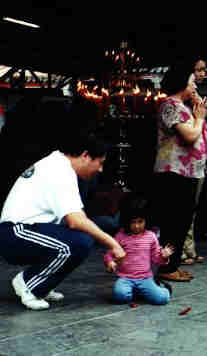Celebrating Chinese New Year - 中國新年

This year Chinese New Year fell on January 24th of the solar calendar. San Francisco's China town held a festival market coming into the New Year and will be holding a parade a week and a half later on a weekend. Other celebrations of the New Year around the Bay Area included the Tet festival of the Vietnamese community held on the Santa Clara County Fairgrounds in the form of a carnival and a Spring Parade also by the Vietnamese community in downtown San Jose. San Jose Mercury News gave quite a lot of coverage on the subject before and after. Still, compared to elaborated new year traditions back home, it is much less. Traditionally, the Chinese New Year celebrations start on the sixteenth of the twelfth month of the lunar calendar. That's when employer gives a feast to treat the employees. Many households pay one last respect to the Earth God for the year on this day as well. While companies put on elaborated banquet in restaurants, around the family tables, members of the family wrapped a feast of their own with a piece of tortilla like but thinner flour wrapper and as much bean sprouts, carrot shreds, bamboo shoot shreds, pressed tofu shreds, egg omelet shreds and ground peanuts one can stuff into one wrap. After this meal, the preparation of the new year begins.
One big task before New Year arrives is to send off the gods. The gods that live around us take their annual trip back to heaven around the 24th of the twelfth lunar month. Among them is the "kitchen god" that lives in our house and knows every misbehavior we may have. To bribe him from reporting our misdeeds to the almighty Jade Emperor, we cook sweet rice ball soup just for him.
Now we are geared up to have a clean sweep for the New Year. Out with the old in with the new. Settle old debts. Clean around the house and inside out. Write or buy red paper banners for decoration on the doors and the sides of windows. On the last day of the year, we first pay respect to the gods, then to our ancestor, put up the red paper banners and wait around the table for family members to arrive from afar for the last and the biggest feast of the year.
Most stores do not open until the fifth day of the new year so there are five off days, including New Year's Eve, for the New Year's holidays. On the second day of the new year, married daughters go back to their maiden homes bringing gifts showing off what a good match her parents had made her. Children also look forward to visiting their maternal grandparents and being completely spoiled for a day. On the fourth day of the new year, the gods are said to be returning to their usual posts in temples from heaven and people visit their local temples for a prediction of what's coming for the new year.
The 9th day of the New Year is said to be the birthday of the Almighty Jade Emperor who reigns from heaven to earth including all living things big and small. There are some temples that keep an idol of the Almighty Jade emperor but most people regard the heaven as the embodiment to this god of gods. And to pay respect to the Almighty Jade Emperor, people prepare a much more elaborated offerings than usual and bow with incense toward the sky. Number nine represents the extreme Yang. It maybe the reason why this day is dedicated to be the birthday of this god.
Finally the festival ends on the fifteenth night of the year with the display of lanterns in temples and Children parading with home-made or nowadays store bought lanterns as fancy as can be, thus the name, Lantern Festival for this day. It is also a popular day for firecrackers. In folk belief, lantern is associated with male offspring and fire and heat with monetary fortune. Thus this day becomes a popular day for people to go to temples to pray for a male offspring and for merchants and store owners to light as many firecrackers as they can to bring in abundance of profits. Gradually, things will go back to normal until the next new year.